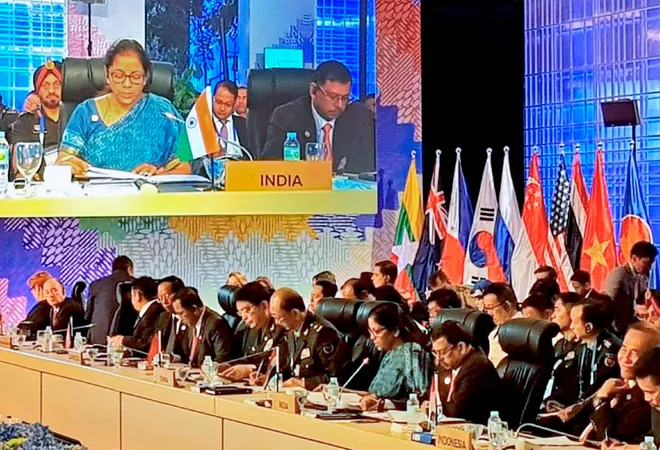 This is the sixteenth part in the series
This is the sixteenth part in the series The China Chronicles.
Read all the articles here.
There has been plenty written in recent times about the 'all-weather' friendship between China and Pakistan. While historically, Sino-Pakistan relations have been of a military nature, the China-Pakistan Economic Corridor (CPEC) has put their economic relations at the forefront. The $46 billion network of roads, oil and gas pipelines, dams, ports, industrial and agricultural projects connect the Western Xinjiang province of China to Gwadar in Balochistan, giving China direct access, across the subcontinent, to the Arabian Sea and new markets. The project has the potential to deepen the relationship between both countries, while simultaneously changing the geopolitics of the Asian region. The Sino-Pakistani relationship has withstood the test of time. Yet there are some inherent road bumps in CPEC that will test their 'shared interests.'
It would be an unfair assessment to believe that China's close relationship with Pakistan, and more specifically the billions of dollars in investments, emanates from Beijing's altruistic nature. The fact is that while CPEC will flush billions into the struggling Pakistan economy and rapidly speed up its development infrastructure, it is also one part of China's vision to rewrite the rules for the next era of globalisation, through its One Belt One Road project. Its interests in Pakistan can are threefold: secure its economic development and connectivity projects in the region; contain the rise of Islamic extremism and control Indian power in the region.
In order to secure these specific set of economic and security interests, Pakistan serves as China's 'hedge' against India and US interests in the region.
While China does not want groups such as the Afghan Taliban to destabilise Afghanistan, it continues to 'strike deals' and appease them through the Pakistani military. Instead of using its influence with the Pakistani military and civilian establishment to crackdown on militants and terrorists, it uses Pakistan's loyalty to ensure that groups do not target Chinese interests, and instead focus their activities in India and Afghanistan. The launch of Operation Zarb-e-Azb in 2014 saw the army carrying out large-scale military operations against militants in the North West tribal regions of the country. While it was interpreted that the operations were the result of American pressure to crack down on Taliban safe havens, it is more likely that Islamabad was coaxed by Beijing into being a "supporter" of the US war on terror in Afghanistan. The operation focused on targeting members of the Pakistani Taliban that regularly threatened the domestic stability of the country and Uighur militants who were members of the East Turkestan Islamic Movement (ETIM), targeting China. Simultaneously, groups such as the Haqqani Network and the Afghan Taliban were given a free reign to carry out subversive activates in India and Afghanistan. Beijing has at numerous times, come to Islamabad's defense at the United Nations and other global bodies, lobbying for it against India. This is because it sees such militant groups as the required hedge against growing Indian power and has therefore considered them vital to its own national security interests.
 Source: Flickr user kattebelletje
Source: Flickr user kattebelletje
Such a policy promises to have long-term security implications for the region. Present Chinese logic dictates that by pumping in investments in infrastructure, agriculture, industry and transport, there will be a significantly growth in Pakistan's sluggish economy thereby alleviating challenges posed by poverty, lack of education, militancy and radicalisation, transforming Pakistan forever. While that may be true to a certain extent, an argument can also be made that, just as economic development can bring about an improvement in domestic security; the reverse is also true, domestic insecurity can hamper economic development. Pakistan continues to remain a safe haven for militants to train, recruit and orchestrate terror plots across the world. Its crackdown on the TTP has resulted in a backlash from factions and splinter groups of the militant organisations. The Islamic State, which operates from the eastern province of Nangarhar in Afghanistan has also successfully demonstrated its ability to launch attacks in Pakistan. Even if Beijing has struck the right cord with the military establishment in Rawalpindi, ensuring that militants will not attack China, its billion dollar investments in the country remain in jeopardy.
China's pet-Pakistan project is therefore inherently flawed. It is bound with unreal expectations, double standards and a high-risk undertaking.
Until now, 'managing tensions' in South Asia has been in Chinese interests. It has however risked improving relations with India by consistently shielding Pakistani terrorists. While CPEC may bring the short-term gains Beijing is looking for, developing a multi-billion project in a terror-infested country is a disaster waiting to happen. The security of CPEC and Chinese nationals in Pakistan has been Beijing's foremost concern. Lt. Gen Qamar Bajwa, in one of his first acts as ISI chief travelled to Beijing to reassure the Chinese of the same. While China may make demands of Pakistan, the onus is on Islamabad to keep good on its promises. By not forcing Pakistan's hand to cut ties with all militant groups, China is playing a risky game, one where it stands to lose more than a few billion dollars. As Hillary Clinton once reprimanded Pakistan, "You cannot keep snakes in your backyard and expect them to only bite your neighbours." The statement could have been very well directed at China. If Beijing truly wants its connectivity projects to be a roaring success, it must first ensure that Pakistan no longer maintains ties with extremists, which will allow Xinjiang to develop in a stable and secure environment.
The views expressed above belong to the author(s). ORF research and analyses now available on Telegram! Click here to access our curated content — blogs, longforms and interviews.



 This is the sixteenth part in the series The China Chronicles.
Read all the articles
This is the sixteenth part in the series The China Chronicles.
Read all the articles  Source: Flickr user
Source: Flickr user  PREV
PREV


